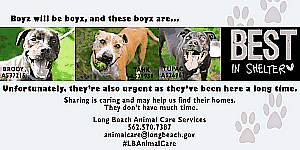[LB Animal Care Services release text] ....Distemper poses no health risk to humans; however, Animal Care Services shares the following tips to help prevent animals from contracting distemper:
- Vaccinate your dogs and cats.
- Although distemper poses no threat to humans, anyone bitten or scratched by a raccoon must contact their physician immediately.
- Feed pets indoors.
- Those who feed pets outdoors should take special care to remove any leftover food. It can attract infected animals not completely debilitated by the disease.
- Please do not feed wildlife. Feeding wildlife may lead to large concentrations of animals around food, increasing the spread of disease.
- Restrain your pets; do not allow them to roam. Keep dogs on a leash when outside your property.
- If you observe a sick wild animal, do not approach the animal. Report sick or injured animals by calling Animal Care Services at 562.570.7387 and describing your observations and the location of the animal.
A healthy animal may contract canine or feline distemper from direct contact with an infected animal or its bodily secretions and waste. Under most environmental conditions the virus does not survive long outside the body; therefore, transmission requires close interaction between animals to enable direct contact or aerosol exposure. Many of the symptoms displayed by an animal with distemper are very similar to symptoms displayed by a rabid animal (only testing of brain tissue can determine if an animal is rabid).
In the initial stages of canine distemper, the major symptoms include high fever, reddened eyes, and a watery discharge from the nose and eyes. An infected dog will become lethargic and tired, and will usually become anorexic. Persistent coughing, vomiting, and diarrhea may also occur. Symptoms of feline pan-leukopenia, commonly referred to as feline distemper, include fever, vomiting, diarrhea and sudden death.
Animal Care Services tested the three raccoons after noticing signs of possible distemper in raccoons in Long Beach.
Low cost pet vaccination clinics are held monthly in Long Beach parks. The next clinics are scheduled for Saturday, February 7, at Bixby Park, 130 Cherry Ave., from 10:00 - 11:30 am; and at Silverado Park 1545 W. 31st St., from 1:30 - 3:00 pm. For more information and for other dates and locations please visit www.longbeach.gov/acs.










